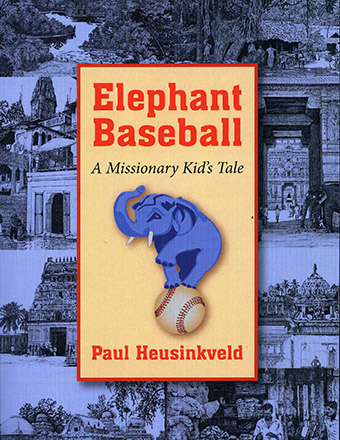
The book “Elephant Baseball” by Paul Heusinkveld offers an insider’s view of a unique world: the boarding-school experience of a missionary kid.
Heusinkveld is a 1972 Hope graduate who is spending the year as a research fellow with the A.C. Van Raalte Institute at Hope College. His book “Elephant Baseball: A Missionary Kid’s Tale” has been published by William B. Eerdmans Publishing Company of Grand Rapids and Cambridge, U.K., in the Historical Series of the Reformed Church in America (RCA).
Now retired after a career with the U.S. Department of State, he was a student at Kodaikanal School in the mountains of south India from fifth grade through his high school graduation in 1968. The school was established in 1901 by members of multiple missions from the United States and Europe to provide education for their missionaries’ children. His parents were RCA medical missionaries serving in Bahrain when he began attending.
In chronicling portions of his eight years at the school, he paints a picture of both the moment in time and place, and his own journey of discovery as the experience shaped him.
“Paul Heusinkveld gives us a close-up look of the exotic wonders of India, intertwined with glimpses of boarding school life in its southern hills,” said Virgil Miedema, a retired foreign service officer with USAID and author of the books “Mussoorie and Landour, Footprints of the Past” and “Murree: A Glimpse in the Forest,” which concern India and Pakistan. “The camaraderie among the boarding school kids, the exciting and sometimes trying experiences of a boy far from home, and the wrenching separations from family that occurred at the beginning of each school term are all evocatively recalled.”
The book’s title comes from an informal sport developed by boys at the school. Heusinkveld found the combination of local environment and his home country’s national pastime a reflection of how the disparate elements of his experience blended in sometimes unlikely ways.
Even at the time he appreciated the international character of the school, for which he was already prepared after living in Iraq and Oman as well as the United States with his parents. He also has good memories of more—the deep friendships formed with the other students as they both learned and lived together; the culture of India; the teachers and staff, also from around the world—and sometimes conspiring to avoid the adults for activities like after-hours pillow fights.
“It was an exciting, fun life that gave me a great deal of insight into the world, to meet a lot of different people, to think in different ways,” he said in an interview with RCA archivist Russ Gasero.
His schoolmates included students whose parents were also in the Middle East as well as India and multiple other nations in Asia, along with others whose parents were academics or posted overseas on business. The mix of nationalities included French, German, Indian, Burmese, Sri Lankan, Swedish, Americans and others, and how they related was heartening.
“It didn’t seem to bother us at all. We were just kids and got along well with each other. It was in that way something that I wish we could repeat in the rest of our lives.”
He went on to Hope after graduation, and subsequently to serve as an officer in the U.S. Navy and then with the Department of State. He served in Saudi Arabia (Jeddah), Kuwait, Bahrain, Syria (Damascus), Israel (Tel Aviv), Italy (Rome), Belgium (Brussels), England (London) and Spain (Rota), as well as seven tours in Washington, D.C. He retired last December and just relocated to Holland with his wife, Michelle, who was also with the Department of State. He’s happy to be near his two children, Karl and Tegan, who are students at Hope, and is active with Hope College’s Hope Academy of Senior Professionals (HASP) and a visiting scholar at the Van Raalte Institute, where he is writing a book about an RCA missionary, Eleanor Calverley, who was the first doctor in Kuwait.
He credits his Kodaikanal experience, along with his younger years in the Middle East, with playing an essential role in preparing him for his career with the Department of State.
“”I could go between these different cultures and these different languages naturally,” he told Gasero. “They could send me to some of these posts overseas that were quite difficult posts, and not only did I want to be there I could do well there because I was used to it.”
“It’s something that helped the State Department in their mission, and I thoroughly enjoyed it,” he said. “So my upbringing very clearly had an effect on the career that I went into.”
Kodaikanal School still exists, but with a different focus. As the environment for mission service has changed, the cohort of “mish kids” has long since declined. The school is now Kodaikanal International School, a nondenominational Christian school offering an International Baccalaureate Diploma. Its student body continues to come from around the world.